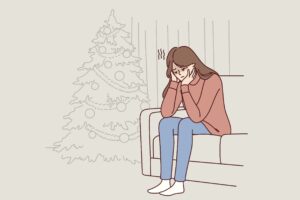
The holiday season is an exciting and picturesque time filled with joyous celebrations, family gatherings and long-awaited traditions. But behind the rose-colored glasses therein lies an intense pressure to create picture perfect memories that can leave us feeling totally drained. If this sounds all too familiar, fear not. Your Holiday Survival Guide awaits you!

Seasonal Struggles
It’s not uncommon for mental health issues to spike around the holidays. According to numbers from the National Alliance on Mental Illness (NAMI), 64% of people living with a mental illness have felt that their conditions worsen around the holidays. The highest rates of child psychiatric hospitalizations also happen in the winter, according to the same report.
Common mental health issues around the holidays include seasonal affective disorder (SAD), loneliness, grief and loss, financial stress, family conflicts and trauma. On top of this, the stress of gift giving, overloaded schedules due to holiday celebrations and events, and the pressure of having a “picture perfect” holiday season can be a pressure cooker for our mental wellbeing.
Whether someone is facing worsening long-term mental health problems or short-term mental health problems, these issues need to be taken seriously. Left untouched, they can lead to clinical anxiety and depression.

Practicing Self-Care
There are many things we can do to improve our mental health around the holidays—including therapy, self-care and rest.
Here are some of the top seasonal mental health issues—and what you can do about them.
Lack of “Holiday Spirit”
The pressure to be joyful, social and in the “holiday spirit” can make it more difficult to recognize we’re struggling and to seek help. You don’t have to force yourself to feel happy or fake happiness around others. Try not to judge yourself or feel guilty for having these feelings. Many people also feel this way.
Identifying triggers and getting to the root cause of why you feel anxious or sad around the holidays can help you process and accept these feelings in a healthy way. Avoid numbing your feelings with alcohol or other substances—these can actually worsen depression and anxiety. Talk to others who feel the same way or who are a solid support system.
Social Pressure
The increase in social events during this season can lead to overwhelm and burnout—especially for introverts or those with social anxiety. Know that it’s okay to not attend every event and to turn down invitations. Accept your limitations. Schedule time for self-care and alone time. Prioritize what events or celebrations are most important to you. Make time for guilt-free rest. Realize that you can’t do it all—no one can.
Financial Pressure & Strain
Plan ahead by deciding on a budget and sticking to it. If you’re unable to give gifts this year, be honest and let people know. Suggest doing Secret Santa or a White Elephant Gift Exchange to reduce financial burden and the number of gifts you need to get.
Make homemade gifts from the heart instead of blowing your budget on store bought items. Clearly communicate your financial limitations and stick to your financial boundaries—especially if others are pressuring you. Help out a neighbor, loved one or stranger. Know that generosity isn’t determined by how much money you spend on others. The act of giving is more important than any dollar amount.
Grief & Loss
Grief and loss can be especially difficult to deal with during this time—especially if you’ve lost someone around the holidays. Don’t compare your situation to others or expect yourself to grieve a certain way. You don’t have to force yourself to celebrate if that’s not what feels right. Let your friends and family know when you need help, and what they can do to help. Speak to a therapist or join a support group.
Loneliness
Feeling lonely around the holidays is very common—and the pressure to have a close knit family or romantic relationship only makes it worse. Rethinking your expectations of what the holidays “should” look like can drastically help with loneliness. Try reaching out to friends or neighbors, or volunteering. Limit social media use is a helpful way to stop comparing yourself to others. Know that it’s perfectly fine to take a friend to a holiday party or to go alone.
Despite what holiday movies make it seem, many people have strained relationships with their families. It’s perfectly normal to not have a romantic relationship during this time (or any time!) of the year.
It’s also perfectly fine to participate in holiday traditions or celebrations by yourself—and to even make your own traditions. Spend time focusing on the positives in your life and doing things that make you happy.
Seasonal Affective Disorder
For some, lack of sunlight and shorter winter days can cause seasonal affective disorder, a type of depression that happens in cold months. Sticking to a routine, using a light therapy lamp, and medication and therapy can all help with SAD symptoms. Check out this blog post for more ways to help with SAD.

Final Thoughts
This bustling holiday season, don’t forget to give yourself the gift of self-care and much-needed rest. Often, when it feels like there’s no time for these things is when we need them the most.
In addition to the tips featured throughout this blog, therapy and medication are excellent resources when dealing with mental health issues.
At Valera Health, we offer a variety of mental health services from experienced, licensed physicians. Our services include virtual individual therapy, group therapy, psychiatry and medication management.
We have several remote therapy and support groups to help with grief and loss, depression, anxiety, loneliness and more—as well as a seasonal Holiday Support Group. Check out our group therapy page to learn more.
If you’re interested in signing-up for one of our services, visit https://www.valerahealth.com/consult-today/ or click here to request a free consultation with a dedicated Health Connector who will help you find the right provider for you.